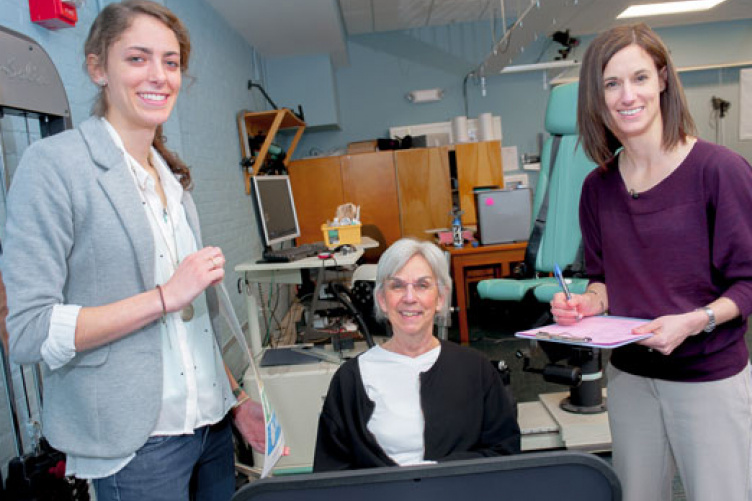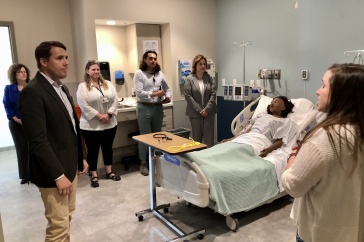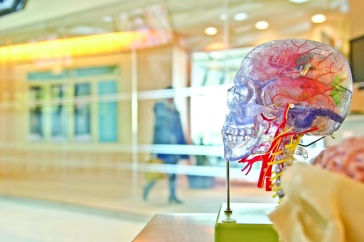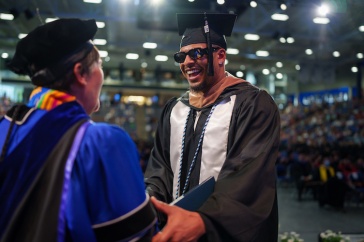
To build strength in elderly adults, UNH researcher Summer Cook has a secret weapon: youth. Specifically, Madeline Allen ’14, who is helping Cook gather data as part of a three-year, $360,000 National Institutes for Health grant and, with support from the Grimes Family Fund, conducting her own research.
Cook credits the study’s unheard-of 100 percent compliance rate by its subjects, who range in age from 65 to 90, to the connections they’ve made with Allen and other undergraduates working on the project. “The older adults are having a great time, and I think it’s because of the relationships they’re forming with the college students,” she says.
Cook, along with co-investigators Dain LaRoche, a colleague in the department of kinesiology, and Pablo Arriaza from the social work department, is exploring the effectiveness of two distinct strength-training regimens on older adults whose muscle weakness puts them at risk for mobility limitations and loss of independence. The study compares traditional resistance training exercises, in which participants build muscle strength by lifting heavy weights, to an innovative program that uses very light resistance coupled with blood flow restriction.
The blood flow restriction program has been shown to increase muscle mass and strength in older adults despite the very light weights. “With this type of exercise, we can prevent muscle atrophy during a period of unloading,” Cook says. “And for people who cannot engage in traditional high-load training due to perhaps arthritis or joint replacements, this blood-flow restricted training might be a viable alternative.”
Serving as mentor and motivator to elderly research subjects as they lift weights in UNH’s biomechanics and motor laboratory is just one role Allen, an exercise science major and track team member from Chestnut Hill, Mass., plays. “I have my hands in every aspect of this study,” she says, listing subject screening, training, data analysis, and strength testing as her duties.
With the Grimes Family Fund, she has designed a shorter sub-study that will look at effects of the training regimens six weeks into the full 12-week study. That halfway point should yield important data, both researchers note, because improvements in strength until that point are due to neuromuscular adaptations – “your brain telling your muscle, ‘now you can contract,’” Allen explains – as opposed to increased size of the muscle.
“We’re going to be able to see, at six weeks, is the muscle getting bigger? Are there improvements in muscle function?” Cook says.
In addition to presenting her research as the keynote at the 2014 Grimes Research Conference during UNH’s Undergraduate Research Conference, Allen hopes to present this work at the regional and national conferences of the American College of Sports Medicine. She and Cook plan to submit research results to peer-reviewed journals. The Grimes Family Fund will send Allen to the two conferences in addition to paying her and Cook a research stipend.
Cook, an assistant professor of kinesiology, works regularly with undergraduates in her lab but sees a unique spark and talent in Allen.
“From the very first time I met Madeline, she said, ‘I want to do research.’ I did everything I could to get her into the lab right away,” says Cook. “A lot of times I look at Madeline in the same way as some grad students.”
For Allen, who plans to continue to pursue research in graduate school, the opportunities provided by the Grimes fund have expanded her education beyond what she might have imagined.
“I feel like I’ve learned every aspect of the research process, and that’s not something you can learn in the classroom,” she says.
Originally published by:
UNH Today
Video produced by UNH Video Productions
-
Written By:
Staff writer | Communications and Public Affairs



















































